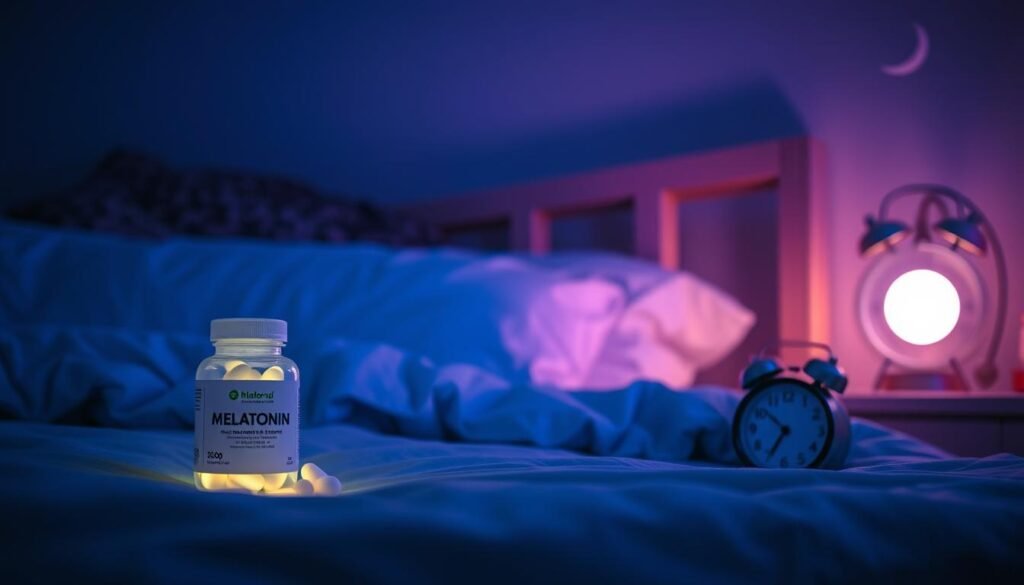Did you know almost 70 million adults in the U.S. have trouble sleeping? Insomnia is a big problem for many. Melatonin has become a go-to supplement for better sleep. But it’s important to know how much to take. Experts say you shouldn’t take more than 10 milligrams at once. A dose of 1 to 5 milligrams, 30 minutes before bed, works best for most. This guide helps you figure out the right amount of melatonin for safe and effective sleep.
Key Takeaways
- Most people benefit from 1 to 5 mg of melatonin taken before bedtime.
- Experts recommend a maximum dose of 10 mg to avoid overdose risks.
- Consultation with a healthcare provider is advised for older adults and children.
- Melatonin is effective for jet lag with dosages typically between 0.5 and 10 mg.
- Using melatonin at the lowest effective dose may prevent potential side effects.
Understanding Melatonin and Its Role in Sleep
The hormone melatonin is key for sleep regulation. It is made by the pineal gland when it’s dark out. This tells our bodies it’s time for sleep. Melatonin is vital for our sleep-wake cycles, important for good sleep. It increases about two hours before we usually go to bed.
What is Melatonin?
Melatonin, discovered in 1958, is known as the “hormone of darkness.” It tells our bodies it’s night, affecting our sleep patterns. It reaches its highest level in our bodies around 3 to 4 AM. Melatonin is both fat and water-soluble, making it easy to move through cells. It lasts about 30 minutes in our bodies and the liver gets rid of it, so timing is key for sleep.
How Melatonin Affects the Circadian Rhythm
Melatonin does more than help us sleep; it also changes our circadian rhythm. Our sleep/wake cycle lasts about 24.2 hours, but this can change from person to person. Light exposure plays a big role in our circadian rhythms, sometimes more than melatonin supplements. Keeping a regular sleep schedule and controlling light exposure is crucial. For more on sleep quality improvement, visit this resource.
Research shows that bright screens at night can block melatonin production. This highlights the need to change our daily habits. Melatonin supplements may help with sleep issues like insomnia or delayed sleep phase disorder. They can be a part of improving sleep health. To learn about mental health and sleep, check out this informative page.
The Benefits of Melatonin for Insomnia
Melatonin supplements are popular for treating insomnia. They are seen as safer than prescription sleep meds. They’re also easier to get, which helps those looking for sleep aid.
Why People Choose Melatonin Supplements
A lot of American adults, nearly two-thirds, use melatonin. They value its help in falling asleep and improving sleep quality. It’s key in setting sleep cycles, helping with jet lag or shift work.
It’s also chosen for children and teens, due to fewer side effects. For adults, using it short-term is considered safe. Doses are usually 1 to 5 milligrams, taken half an hour before sleep.
Natural Remedies for Sleeplessness
There are other natural ways to fight sleeplessness besides melatonin. You can:
- Stick to a bedtime routine
- Avoid caffeine and big meals before bed
- Make your sleeping area peaceful
- Try relaxation methods like yoga or meditation
These habits boost melatonin’s effects for better sleep. More people are considering melatonin plus these techniques for better sleep results.

How Much Melatonin for Insomnia
Finding the right melatonin dose is key for good sleep, especially with insomnia. Knowing the correct amount can ease sleep troubles without bad side effects. Here’s the lowdown on how much adults and kids should take.
Recommended Dosages for Adults
Adults with insomnia should take between 1 and 5 milligrams of melatonin. Starting with a 2 mg slow-release pill about 30 minutes to an hour before bed is best. Adult melatonin dosage might go up to 10 mg for some. But more doesn’t always mean better sleep. It could cause dizziness and headaches. Long-lasting melatonin works better for ongoing insomnia than quick-release types.
Dosage Considerations for Children
Children’s recommended dosage for children depends on their age and health needs. Always check with a doctor before giving melatonin to a kid. Little ones may start with 0.5 to 1 mg. Older children and teens could take a 2 mg slow-release tablet. A doctor might allow up to 10 mg for regular use in cases of persistent sleep problems.
To sum up, being careful with melatonin amounts is crucial for better sleep for all. For tips on improving sleep habits and info on insomnia-related behaviors, check out this resource.
| Age Group | Starting Dose | Maximum Dose | Timing |
|---|---|---|---|
| Adults | 1-2 mg | 10 mg | 30 min – 1 hr before bed |
| Children | 0.5-1 mg | 3-6 mg (up to 10 mg for teens) | 30 min – 1 hr before bed |

Melatonin Dosage for Specific Circumstances
Different situations call for different melatonin doses. The right amount can really help someone sleep better under unique conditions. This includes problems like jet lag or shift work sleep disorder. We’ll look at how to adjust melatonin for these situations.
Melatonin for Jet Lag
Traveling through multiple time zones messes with your internal clock. This can cause jet lag. The usual melatonin dose to ease jet lag is between 0.5 mg to 5 mg. You should take it before sleep in the new time zone. People who take melatonin find they adjust to new sleep times faster and easier.
Using Melatonin for Shift Work
Working night shifts disrupts normal sleep patterns. For those with shift work sleep disorder, melatonin can help regulate sleep. The common dose for this is from 1 mg to 5 mg, taken before the time you want to sleep. This helps stay alert at work and sleep better afterward. Sometimes, you might need to adjust the dose to get the best result.

| Condition | Recommended Dosage |
|---|---|
| Jet Lag | 0.5 mg – 5 mg before bedtime |
| Shift Work Sleep Disorder | 1 mg – 5 mg before sleep |
Safety and Risks Associated with Melatonin
It’s key to know the safety and risks of using melatonin before you try it. While generally safe for a short time, some might face headaches, dizziness, and stomach issues. It’s especially vital for older people and kids to use it carefully.
Melatonin Side Effects to Consider
Melatonin helps many improve their sleep. But, it’s wise to know about its side effects. Users have reported headaches, dizziness, nausea, and feeling sleepy during the day.
- Headache
- Dizziness
- Nausea
- Daytime drowsiness
Rarely, it can cause vivid dreams and mood changes. Be cautious if you’re taking it with other meds, like blood thinners or blood pressure pills. This mix could increase your risk of problems.
Assessing Melatonin Safety for Different Age Groups
Melatonin’s safety changes with age. In kids, there’s some good evidence, but it’s best to talk to a doctor first. Older adults need to be mindful, too. They must consider their other meds and how much melatonin to take.
Not all melatonin supplements are created equally. Their strength and safety can vary. This makes getting advice from health professionals crucial when looking at melatonin’s risks.
How to Take Melatonin for Best Results
Understanding how to use melatonin effectively can improve your sleep a lot. It’s key to take melatonin at the right time for the best effect. Aim to take it about 30 minutes before you go to sleep. This helps your body get ready for bed. It makes falling asleep easier and improves your sleep quality.
Optimal Timing for Taking Melatonin
It’s crucial to take melatonin at the correct time to reap its benefits. It affects your body’s internal clock. Taking it too early or too late may mess up your sleep rhythm. For folks struggling with insomnia or jet lag, taking melatonin at a regular time helps a lot.
Different Forms of Melatonin Supplements
There are different kinds of melatonin supplements you can pick from. Each type works differently for different people. The main kinds are:
- Tablets: These are common and come in doses from 0.3 mg to 5 mg.
- Gummies: A fun, tasty option with similar doses as tablets.
- Liquids: These absorb quickly and allow for easy dose changes, perfect for specific needs.
Knowing about the various melatonin forms helps pick the best one for your needs and lifestyle.
Treating Chronic Insomnia with Melatonin
Chronic insomnia affects about 10% of U.S. adults, making them look for different treatments. Melatonin, which helps control sleep cycles, is popular for those with long-term sleep problems. Since 1999, its use among adults jumped from 0.4% to 2.1%. While it helps with insomnia, experts say a broader approach is better.
Does Melatonin Work for Long-Term Sleep Issues?
Studies show melatonin can help, especially in conditions like Autism Spectrum Disorder. But, melatonin supplements can have less or more of the hormone than claimed. So, while it can help with sleep, quality and dosage issues mean users must be careful. For lasting problems, melatonin alone might not be enough.
Cognitive Behavioral Therapy as an Alternative
For chronic sleep issues, Cognitive Behavioral Therapy for Insomnia (CBT-I) is a good option. It helps change sleep habits and addresses the psychological parts of sleep problems. The American Academy of Sleep Medicine suggests using CBT-I as the main treatment for adults. It aims for lasting solutions beyond the temporary fixes medicine provides. For more on treating insomnia, click here.
Guidelines for Using Over-the-Counter Sleep Aids
Over-the-counter sleep aids are easy to get for those with sleep issues, like melatonin and antihistamines. It’s important to think about their benefits and risks. Understanding the differences between melatonin and sleep medications is key to choosing wisely.
Melatonin vs. Other Sleep Aids
Melatonin is a hormone that tells your body it’s time to sleep. It’s helpful for jet lag or shift work sleep disorders. Its popularity as a sleep aid has grown. But, too much melatonin can cause morning grogginess or mess up your sleep cycle. On the other hand, sleep medicines like benzodiazepines are for short-term use because they can be addictive.
Consulting Healthcare Professionals
It’s critical to talk to healthcare providers before trying any sleep aid. This is especially true for people with health issues or those on other meds. Over-the-counter sleep aids could mix badly with prescription drugs, requiring a doctor’s advice. This step ensures the safe and effective use of sleep aids, reducing the risk of bad effects.
Conclusion
Melatonin is key for good sleep, based on many studies. It can help people fall asleep faster and sleep longer. But, it’s important to use it safely. Experts say taking 2 mg of melatonin 30 minutes before bed is safe for short-term use.
For lasting sleep health, mix melatonin with healthy sleep habits. This means keeping a regular sleep time and making your sleeping space cozy. It might also help to talk with a doctor for advice that fits just you. This mix can really improve your sleep quality.
The best way to beat insomnia involves more than just pills. It’s about overall good sleep habits. As more people talk about sleep troubles, understanding options like melatonin matters. This helps everyone make smarter choices for a healthier night’s sleep.